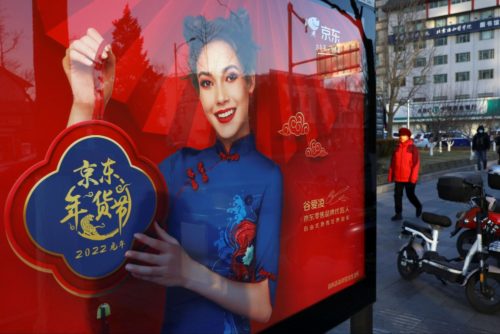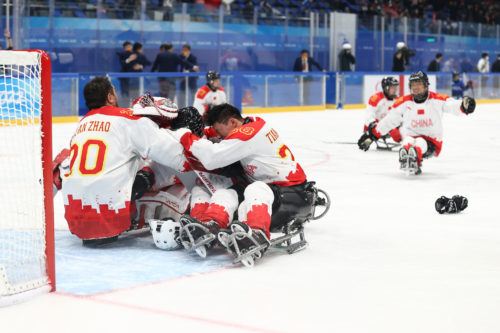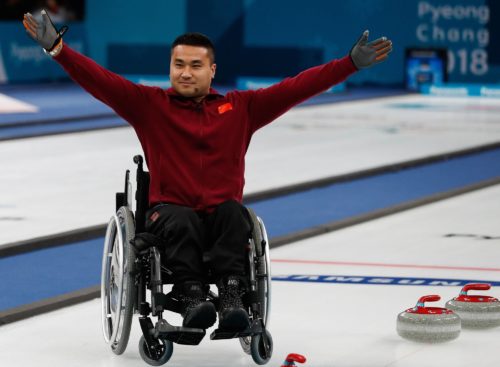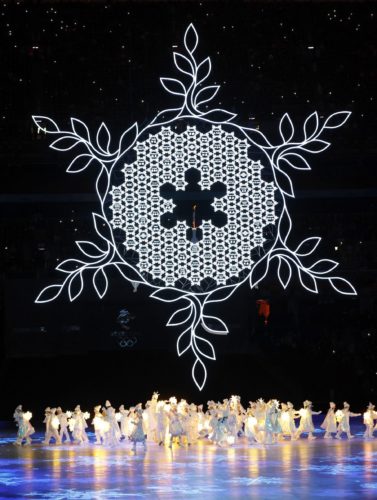Eileen Gu’s support of U.S. Winter Olympics bid catches Chinese state media’s attention
The sheer amount of reactions has been a testament to the skier’s superstar status within China — and her enduring influence.

On Tuesday, while attending Time Magazine’s TIME100 Summit in New York, freestyle skier Eileen Gu (谷爱凌 Gǔ Àilíng) announced that she would become an “ambassador” for the U.S. Olympic Committee’s efforts to host a Winter Olympics in Salt Lake City in 2030 or 2034. Characterizing her position as a “beautiful example of globalism,” the 18-year-old said that she was honored to “be part of the whole thing,” and believed in the power of winter sports to connect people all over the world.
Tom Kelly, a spokesman for the Salt Lake City bid committee, confirmed Gu’s participation to the Associated Press, saying that the Olympic star was “working with” them as an “athlete representative” for now.
It took almost no time for the news to reach China, where Gu’s announcement was the second-most-read topic on Weibo on Wednesday morning. According to Bloomberg, a hashtag related to Gu’s comments — including her saying that she did not regret representing China at the Beijing Winter Olympics — garnered some 26 million at one point, before Weibo started restricting discussions.
The sheer amount of reactions has been a testament to Gu’s superstar status within China — and her enduring influence.
Born in the U.S. to a Chinese mother, the young skier became a household name in China after switching national affiliations in 2019 and winning two gold medals and a silver at this year’s Beijing Winter Olympics. Fondly nicknamed “Snow Princess” by her Chinese fans, Gu reportedly brought in 200 million yuan ($31 million) in 2021, mostly fueled by endorsement deals with two dozen brands, including Chinese ecommerce giant JD.com and Luckin Coffee, which is Starbucks’s Chinese rival.
The Global Times, China’s state-run tabloid, got in on the act, publishing an editorial yesterday in support of Gu’s decision, saying that many Chinese internet users reacted to the news with “an open-minded attitude” while urging American media to stop “politicizing” the matter and “exaggerating” negative comments on the Chinese internet.
Gu has been painted as the new face of China’s international image and a paragon of women’s empowerment. But questions about her nationality and loyalty still linger in some Chinese people’s minds. Last month, before Gu flew back to the U.S. (where she is expected to attend Stanford), her farewell message on Weibo was met with mixed reactions. While some of Gu’s supporters thanked her for winning medals for China and being a role model for young women, others expressed disappointment and downright anger, with some of Gu’s most ardent fans turning into her toughest critic and calling her an “opportunist” who used China to further her athletic career and make a fortune.
After Gu’s ambassador announcement, some Chinese social media users criticized her decision, but the vast majority expressed support and praised Gu for looking beyond geopolitical tensions to promote winter sports. Many pointed out that Time Magazine referred to her as “China’s Eileen Gu,” saying this was positive publicity for a top-level Chinese athlete.
“She’s overcompensating for her decision to represent China in 2022,” Mark Dreyer, co-host of the China Sports Insider podcast, wrote on Twitter when the news came out. He told The China Project that although he applauded Gu’s ambition to unite the world through sports, a “noble cause” that he thinks looks good on paper, “it’s unnecessary for her to insert herself into every conversation.”
“Her playing the ambassador role fits in much better for her narrative about using sports to unite hundreds of millions of people around the world in a way that Salt Lake City doesn’t really need to do,” Dreyer said.
He added that while the young people he’s spoken to both before and after the Beijing Winter Olympics were generally supportive of Gu as an athlete and didn’t care about her dual identity, some Chinese people suspected that financial reasons were the main incentive for Gu to compete for China. “The fact that Gu lives in the U.S. now and has supported the U.S. Olympic bid actually confirmed their suspicions,” he said.
For Salt Lake City, Dreyer said that though it makes sense to get Gu involved in its bid — since she is one of the most high-profile U.S.-based winter sports Olympians currently active — making Gu an ambassador looks like an unnecessary choice. “It just feels like it’s deliberately going to be ruffling too many feathers in the U.S.,” he said.
The Global Times — an outspoken and nationalistic Chinese state media tabloid — has somewhat surprisingly taken an opposite stance, ostensibly championing Gu as a symbol of internationalism. It noted that other Chinese athletes — such as snooker player Dīng Jùnhuī 丁俊晖, figure skater Chén Lù 陈露, and diver Gāo Mǐn 高敏 — have also supported foreign countries’ bids to host Olympic Games in the past.
Dreyer said he found it “a bit odd” for the newspaper to use these examples to justify Gu’s decision, given that the figures Global Times named “are more obviously Chinese athletes, whereas Gu’s upbringing is clearly largely American, and she comes across far more American than Chinese.”
“It’s probably not surprising that none of these examples is particularly recent,” Dreyer said. “This type of endorsement was weird then, and it is weird now.”
The Global Times also dedicated a few paragraphs to condemning “certain American news organizations” for “intentionally ignoring or filtering” positive comments on the Chinese internet about Gu in their coverage. “Those reports emphasized and exaggerated the division between opinions in China’s public discourse,” it said, without naming any specific news organizations. “This is the reflection of the polarization of American politics and society, its ‘distrust’ in ethnic minorities, and its desire to stir up and highlight extreme nationalism in public opinions in China.”
Dreyer pointed out the editorial contradicted some past comments made by Hú Xījìn 胡锡进, the former editor-in-chief of the Global Times, In his previous role, Hu once fretted that China’s embrace of Gu was too enthusiastic, saying it could backfire in the future.
Dreyer thinks Hu wasn’t wrong. “Hypothetically speaking, Gu might want to compete for the U.S. team one day. What will the Chinese government and Chinese people think of her if that happens?” he said. “You ought to be a little bit realistic and be aware of the temperature of the relationship. So when you come out and say, ‘I’m going to just ignore geopolitical tensions and everything will be happy and fine,’ you just come across as a bit tone-deaf.”






